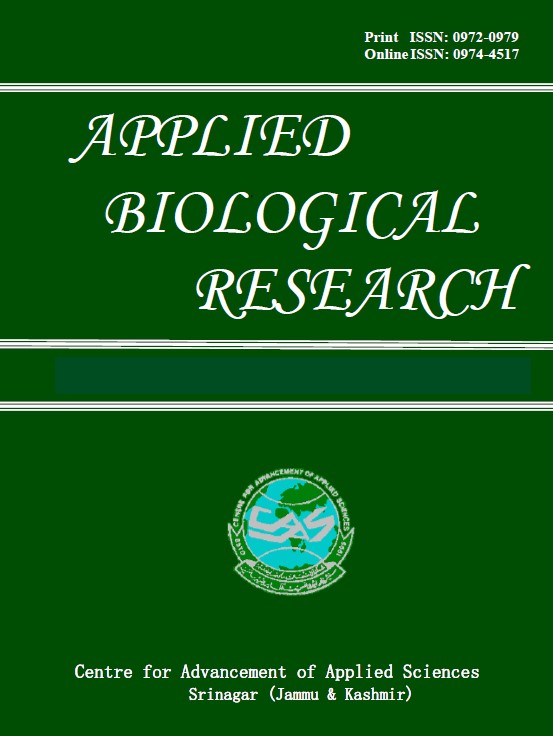Microbiology And Histo-Pathology Of Mandibulofacial Abscess In A Balb/C Mouse
DOI:
https://doi.org/10.48165/Keywords:
Microbiology, Histo-Pathology, MandibulofacialAbstract
Among the various laboratory animals, mice and rats with their extensive use in bioscience research, have achieved an unparalleled level. These animals are no different from others with respect to the possibilities of adventitious and opportunistic infections. These organisms usually do not cause any clinical disease but instead causes physiological alterations rendering the animals unsuitable for experimental studies. Although the number and prevalence of these pathogens have declined considerably, but many are still around and may infect the colony. Facial abscess is the one among such infections and the present report describes the microbiology and histopathology of a mandibulofacial abscess. Earlier, a few cases of natural occurrence of maxillofacial abscesses in mice has been reported (Lawson, 2010); however, the present case is first of its kind with dual infection of methicillin resistant Staphylococcus aureus (MRSA) and Pseudomonas aeruginosa resistant against multiple antimicrobial drugs.
Downloads
References
Blackmore, D.K. and Francis, R.A. 1970. The apparent transmission of staphylococci of human origin to laboratory animals. Journal of Comparative Pathology, 80: 645-651.
Clarke, M.C., Taylor, R.J., Hall, GA. and Jones, P.W. 1978. The occurrence in mice of facial and mandibular abscesses associated with Staphylococcus aureus. Laboratory Animals, 12: 121- 123.
Holt, J.G., Krieg, N.G., Sneathm, P.H.A., Staley, J.T. and Williams, S.T. 1994. Bergey’s Manual of Determinative Bacteriology. Williams and Williams, Baltimore, Madison, USA. Hong, C.C. and Ediger, R.D. 1978. Preputial gland abscess in mice. Laboratory Animal Science, 28: 153-156.
Jayshree, Singh, V.K., Kumar, A. and Yadav, S.K. 2016. Prevalence of methicillin resistant Staphylococcus aureus (MRSA) at tertiary care hospital of Mathura, India. Progressive Research – An International Journal, 11(Special-VIII): 5495-5498.
Joiner, K.A., Onderdonk, A.B., Gelfand, J.A., Bartlett, J.G. and Gorbach, S.L. 1980. A quantitative model for subcutaneous abscess formation in mice. British Journal of Experimental Pathology, 61: 97-107.
Lawson, G.W. 2010. Etiopathogenesis of mandibulofacial and maxillofacial abscesses in mice. Comparative Medicine, 60: 200-204.
Luna, L.G. 1968. Manual of Histologic Staining Methods of the Armed Forces Institute of Pathology (3rd edn.). McGraw-Hill, New York, USA.
Needham, J.R. and Cooper, J.E. 1976. Bulbourethral gland infections in mice associated with Staphylococcus aureus. Laboratory Animals, 10: 311-315.
Sergio, D.B., Koh, T., Hsu, L., Ogden, B.E., Goh, A. and Chow, P. 2007. Investigation of methicillin resistant Staphylococcus aureus in pigs used for research. Journal of Medical Microbiology, 56: 1107-1109.
Singh, V.K., Kumar, A., Jayshree and Yadav, S.K. 2017. Prevalence and antibiogram of the Psuedomonas aeruginosa isolates in clinical samples of companion animals. Indian Journal of Comparative Microbiology, Immunology and Infectious Diseases, 38: 37-42.
Walther, B., Friedrich, A.W., Brunnberg, L., Wieler, L.H. and Lubke-Becker, A. 2006. Methicillin resistant Staphylococcus aureus (MRSA) in veterinary medicine: A new emerging pathogen? Berl Munch Tierarztl Wochenschr, 119: 222-232.
Wilson, P. 1976. Pasteurella pneumotropica as the causal organism of abscesses in the masseter muscle of mice. Laboratory Animals, 10: 171-172.

